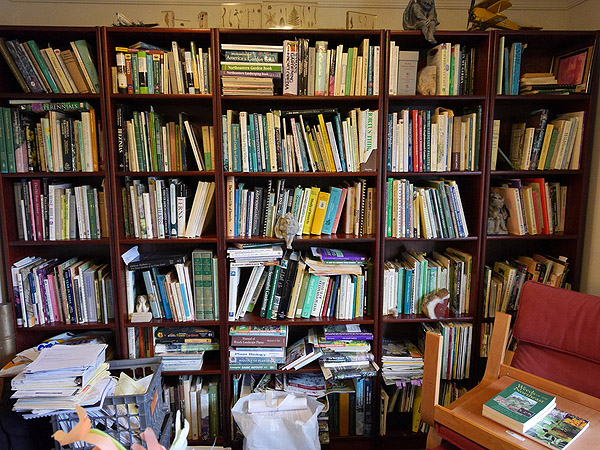

A gardener’s education is never over.
Every year we plant, and most of us learn again. Hopefully we learn more as the time passes.
For me, the days of winter are when I get to catch up on my reading, which is a critical part of my education. Stacks of magazines, newsletters and catalogs all get read, noted, dog-eared and peppered with notes.
I also mull the mistakes of the past gardening year. Why did one hosta among 30 rot and die? Why did the Japanese beetles seemingly disappear, then a week later return with a vengeance? Why did three of nine tomato plants die within days of planting while the other six thrived and were productive? Why did one of four newly planted rhododendrons shrivel and die when the three just feet away did just fine? And why do the hummingbirds follow the woodpeckers who circle the trunk of my most ancient maple as the woodies search for grubs and bugs under the bark and in the holes they peck?
I have most of the answers already. By winter’s end I’ll probably have the rest.
I rely on my library of more than 1,000 horticulture and gardening titles, 40 years’ worth of filed folders, and decades’ worth of saved and indexed magazines and catalogs. I’ll make phone calls and send emails to friends and colleagues, including educators, researchers and other gardeners.
What I can’t rely on though is my years of college training that I’ve had in horticulture. I don’t have any.
Yes, I’ve had hundreds and hundreds of classroom hours in botany, horticulture and entomology. I’ve taught hundreds, if not thousands, of students. But my college degrees seem to say English and journalism.
You don’t need a formal college education to be a gardener or a horticulturist. You do, however, need an education in either gardening or horticulture if you want your garden and landscape to thrive and succeed. Notice that I said an education—not a degree.
Many years ago I had the pleasure of meeting Ed and Mildred Thompson of Hill Street in Southampton Village. Those who have lived on the East End for many years may recall passing their property because there was a small building right on Hill Street that contained their business. Ed and Millie were plumbers. Millie was the first woman plumber I’d ever met but that wasn’t what she wanted to be known for; and it wasn’t.
If you looked behind the building that proclaimed “E&M Thompson Plumbing” there was a house with a double garage under the living space. When the garage doors were open on warm days you would see the unmistakable glow of grow lights.
If you got a special invitation and got into the building you would see that Ed and Millie were up to much more than plumbing. You’d find lots and lots of begonias—from the usual to the most rare.
Ed and Millie had no formal education in horticulture or botany, and while that forever needlessly vexed them, for at least two decades they were the world’s leading experts in their field. They traveled extensively, lecturing on begonias and amassing a begonia collection that botanical gardens fought over. Their book, “Begonias, The Complete Reference Guide,” still remains the premier reference for the genus.
Two plumbers.
So, you ask me, how can I learn about gardening and horticulture?
First, you have to have the passion. The rest is easy, but it takes time.
I started by reading. I read everything I could get my hands on. I may be the only living human who has read “Hortus Third: A Concise Dictionary of Plants” and Afred Byrd Graf’s “Exotica” (it’s a plant book, not something naughty) from cover to cover.
Two of my favorite money pits were the bookstore at the Farmingdale State University, where I would buy horticulture textbooks, and the bookstore at the New York Botanical Garden, where I would buy books on everything relating to gardening.
But you can’t just read. You have to do as well.
You have to get out and get dirty. You’ll get so dirty you’ll be able to farm under your fingernails. And yes, your back will hurt. You have to be willing to fail, because you will, even if through no fault of your own. But you’ll learn.
As long as you aren’t set on doing scientific research and getting it published in a peer-reviewed journal you don’t need a degree in horticulture. But you will probably need some classroom instruction.
A good place to start is with the Master Gardeners program that most County Cooperative Extension offices offer. Suffolk has one in Riverhead through the Cornell Cooperative Extension.
If you’re willing to give up a couple of hundred hours of your time, you’ll get a great education and hook up with some of the top people from Cornell. In return you’ll have to do some community service work but the education you’ll get and the resources that you’ll have available for learning will be second to none.
Cornell Cooperative Extension of Suffolk also offers ongoing lectures, certification classes and other programs on an avocational and professional level. You can call the offices in Riverhead or drop by and pick up literature on the various programs.
If it’s classroom work that you want, then look at the programs offered at Suffolk Community College and at SUNY Farmingdale. Both offer a series of programs leading to certificates and degrees in horticulture, depending on how much time you are willing to commit. In some cases you can register for classes without being a matriculated student but these are generally lower-level classes that do not require pre-requisite courses.
Both the New York Botanical Garden in the Bronx and the Brooklyn Botanic Garden offer hundreds of classes and courses. You can simply go online or call the gardens to get their catalogs and get on their mailing lists.
The New York Botanical Garden also offers several certificate level programs through its professional school of horticulture. And one of the best programs in the country is offered at Longwood Gardens in Pennsylvania. Obviously this would have to be a residential program for East Enders but it’s an outstanding program that’s has a great track record. It’s also linked with the University of Delaware if you should decide to move over to the academic side.
I know a few Wall Street moguls who have given it all up to learn horticulture. I know an ordained rabbi who decided to become a florist. I also know a well-known wine merchant who became the owner of one of the country’s top perennial nurseries. And let’s not forget what Ed and Millie accomplished.
Do you need books to read or more information on a career change or expanding your gardening knowledge? Let me know. And of course, keep growing.
 More Posts from Andrew Messinger
More Posts from Andrew Messinger